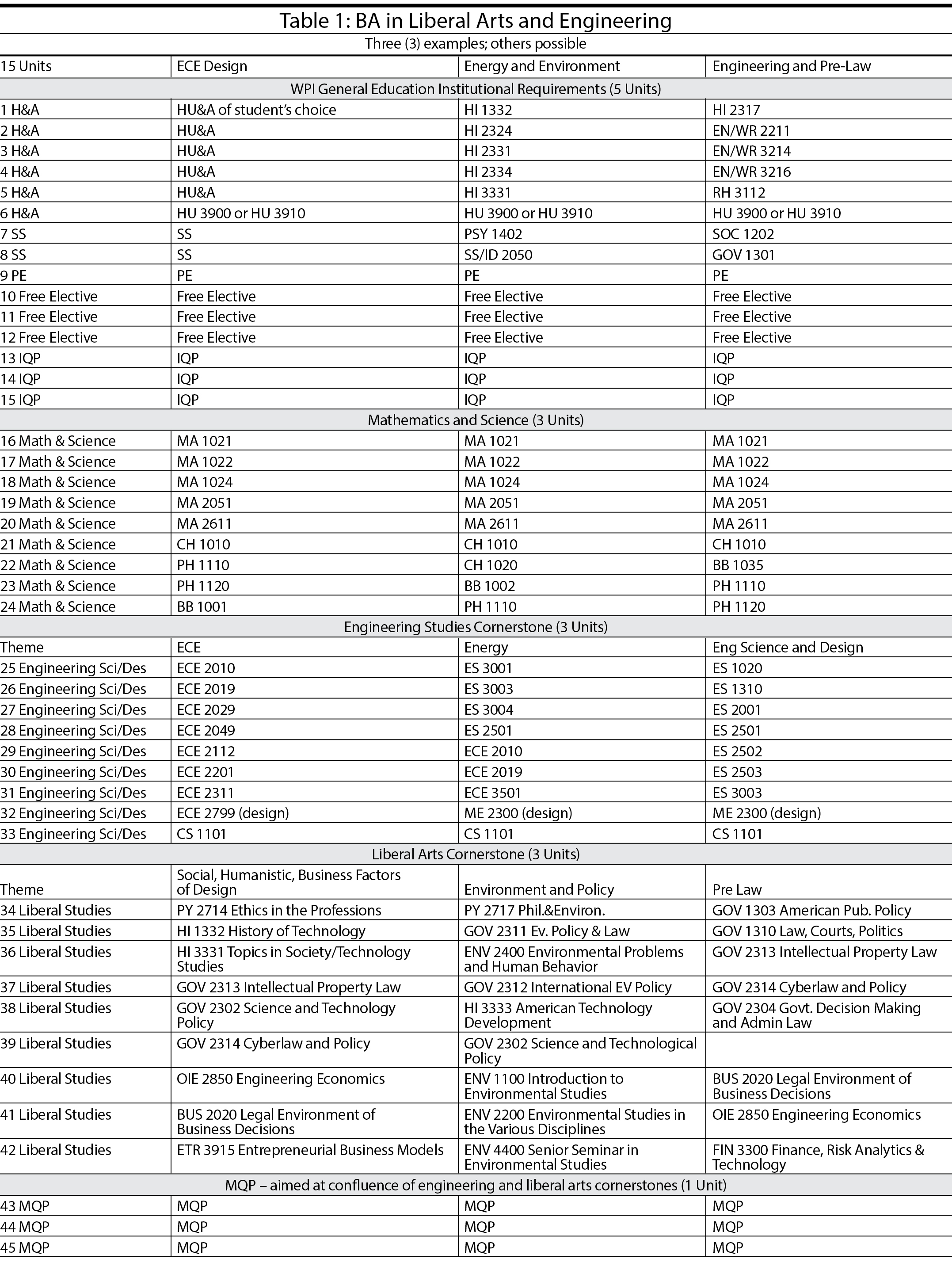DIRECTOR: K. BOUDREAU (HU), D. DIBIASIO (CHE)
The Directors will advise students; other faculty advisors can be assigned from among the Liberal Arts and Engineering Program Committee.
Mission Statement
The goal of the Liberal Arts and Engineering Bachelor of Arts (BA) degree is to provide an opportunity for students who want a broad background in engineering and other disciplines, as preparation for further studies in engineering or in other fields such as medicine, law, public policy, international and global studies, business, or wherever a solid technical background would give them a unique edge. The program is also designed to allow students to transfer to an engineering BS program with minimum loss of time.
For more information, see the Admissions website at
https://www.wpi.edu/academics/departments/liberal-arts-engineering.
Program Educational Objectives
The Liberal Arts and Engineering degree recognizes that societal and technological issues are becoming more and more interdependent. Leaders of government, non-profit and for-profit organizations are typically educated in non-engineering disciplines yet increasingly would benefit from a more technological grounding. The Liberal Arts and Engineering major, with its emphasis on problem solving, will prepare students not only for further study in engineering but also for many other high-level careers, such as:
- Law
- Medicine and health care
- Energy policy
- Environmental policy
- Technology policy
- Finance
- Technology management
- International relations
- Public affairs and political service
- Performing arts, especially in music
- Consulting
Program Outcomes
Graduates of the BA in Liberal Arts and Engineering major will have:
- an ability to formulate and solve problems requiring knowledge of both technological and societal/humanistic needs and constraints
- an ability to apply, as needed, the relevant fundamentals of mathematics, science, engineering, social sciences, and the humanities to solve such problems
- an ability to use the techniques, skills, and modern tools necessary for professional practice
- an ability to function on multi-disciplinary teams
- an understanding of professional and ethical responsibility
- an ability to communicate effectively in oral, written and visual modes
- a recognition of the need for, and ability to engage in, life-long learning, in response to the ever-increasing pace of change affecting societal needs and opportunities
- the broad education necessary to understand the impact of professional solutions in a societal context, both locally and globally.
Programs of Study and Relevant Courses
The Liberal Arts and Engineering program will offer considerable curricular flexibility to accommodate a wide range of student interests, but at the same time will require students to be intentional about developing a coherent program of study consistent with the program’s objectives. Academic advising will play an important role in helping students plan their programs.
For more information and advice about the program, contact Prof. Kris Boudreau (kboudreau@wpi.edu) or David DiBiasio (dibiasio@wpi.edu).
The Engineering Science and Design component of the major (Distribution Requirement 2) must be approved by the Liberal Arts and Engineering Program Committee to ensure that it provides students with a focus in some area of engineering. Guidance and examples will be provided so that students know in advance what types of programs will be approved. The intent is to accommodate creative programs while avoiding programs that lack a coherent theme.
The Social and Humanistic Factors component (see Distribution Requirement 3 and Note 6) should consist of courses that complement engineering and technology to support the educational objectives of the program. The Program Committee will maintain and make available to students and advisors lists of current courses that are acceptable for credit toward this requirement.
Program Distribution Requirements for the Liberal Arts and Engineering Major
MQP (Minimum 3/3 Units)
The MQP provides a capstone experience that builds on both the technical (Engineering Science and Design) and nontechnical (Humanities and Arts, Social Science, and Business Topics) components of the student’s particular program. At least one advisor to the MQP must be a member of the Liberal Arts and Engineering Associated Faculty.

